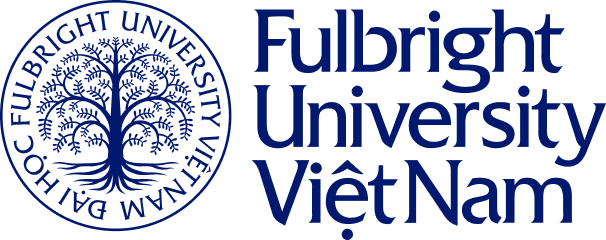
Nguyen Trinh Diem Quynh was one of the 72 first graduates of Fulbright University Vietnam last June. After changing majors thrice and having varied internship experiences, Quynh embarked on the illuminating quest for self-exploration during her undergraduate years. Her ceaseless efforts won her a ticket to Momo as a Product Associate and, right after graduation, to ShopeePay as an Associate Product Manager.

Diem Quynh (middle) spent her beautiful transformative years with her peers at Fulbright campus. Photography by Quynh
Changing majors as an opportunity for self-discovery
Reflecting on her initial choices when starting her studies at Fulbright, Quynh said: “Graduating from a physics-intensive class in a specialized high school made me ‘label’ myself as someone only suitable for natural sciences. Therefore, during my freshman year, I was almost certain I would study Integrated Sciences at Fulbright.”
However, once Quynh felt inspired by the idea of product development and Community Problem Solving (CmPS), she started listening to herself. She then shifted her focus to Psychology, aspiring to listen and understand people’s needs. Quynh believed such knowledge would help her create community-driven research products.
During her sophomore year, Quynh realized that developing quality products requires more than understanding user psychology alone. Additional knowledge of strategy and computation is also fundamental. Once again, Quynh decided to major in Economics and minor in Computer Science.

Diem Quynh currently works as an Associate Product Manager at ShopeePay after changing majors thrice. Photograph by Quynh
For Quynh, changing majors urged her to question herself and reflect upon her growth path. Quynh said: “Amid the volatile job market nowadays, young people like me always need constant learning and innovation. At Fulbright, I’ve embraced interdisciplinary knowledge, discovering and shaping numerous potential versions of myself.”
Fostering a determined and passionate heart for lifelong learning and decision-making
Quynh’s most cherished aspect of her Fulbright experience was the inspiring community that fueled her commitment to lifelong learning. “During my time at Fulbright, the opportunity to connect with human beans passionate about learning and teaching made me extremely proud. I still remember that whenever my friends learned something valuable, they would speak to everyone in the dormitory. Thanks to the Fulbright community, I have nurtured a daily dose of knowledge,” she said.

Diem Quynh (middle) enjoyed her undergraduate years with other Class of 2023 peers at Fulbright. Photograph by Quynh
At Fulbright, Quynh learned a powerful tool from Professor Dinh Vu Xuan Hung: the scientific method. This structured thinking approach, emphasizing observation and critical questioning, became a cornerstone of her learning. It taught her to approach any situation by meticulously observing, formulating a hypothesis, systematically testing it through experiments or analysis, and finally drawing conclusions based on the evidence. When a hypothesis didn’t hold up, she gained encouragement to re-enter the cycle, refining her observations and tests until she reached a deeper understanding. Professor Hung’s logical thinking approach helped Quynh win many entrepreneurial awards. That knowledge still supports her work to this day. “After going through various projects at Momo or Shopee, even though the problems may be bigger, I realized that the framework and methods applied will still revolve around what I learned at Fulbright, especially the sequence thinking skill,” she shared.

Diem Quynh and teammates participated in the 2021 Hult Prize Impact Summit Ho Chi Minh. Photograph by Quynh
In addition to academics, Diem Quynh also has a great passion for music. She conveyed that the teaching style, which welcomed input from professors, and the enthusiasm for knowledge among her peers motivated Quynh to approach her work with dedication — either a song she composed or a startup project in a competition she joined.
“Fulbright Faculty teaches us how to give.”
The founding faculty, including Mr. Kingho Chan and Ms. Pamela Corey, and the staff members initiated the “pay-it-forward culture” at Fulbright. The teachers motivated the pioneering community’s first members, Co-Design, to share items they no longer needed with others who might need them. Thus, the “Tinh lang nghia xom” community was born as a place for people to exchange and give away their items. This culture persists in many following cohorts as a beautiful core memory of student life.
For Quynh, the Fulbright “pay-it-forward culture” goes beyond materialistic sharing; it’s the community effort of continued learning and knowledge exchange. This spirit shaped Quynh’s perspective on life during her school years and onwards. She continued: “In Fulbright’s academia, the “pay-it-forward culture” showcases through the support we receive whenever in need. Anytime I felt unsure of my career choice or job options, I received unwavering support from Lecturer Phan Tuan Ngoc, Lecturer Kinho Chan, or the Center for Entrepreneurship and Innovation (CEI) staff. They introduced me to incredible internship opportunities and provided invaluable mentorship every step of the way.”

Diem Quynh received unwavering support from the Center for Entrepreneurship and Innovation (CEI) staff at Fulbright. Photograph by Quynh
Fast forward to her study and working process, Diem Quynh continues sharing the knowledge she gained with a larger community, carrying the “culture of giving.” Quynh enjoyed helping other people with her knowledge, and, one time, she created a video sharing about Economics and uploaded it to YouTube. Surprisingly, the video gained up to ten thousand views. In an environment that constantly fosters a pay-it-forward spirit, the Fulbright community, in Quynh’s memory, is a safe place to nurture the passion for learning, sharing, and receiving knowledge in return.
Nhu Y








